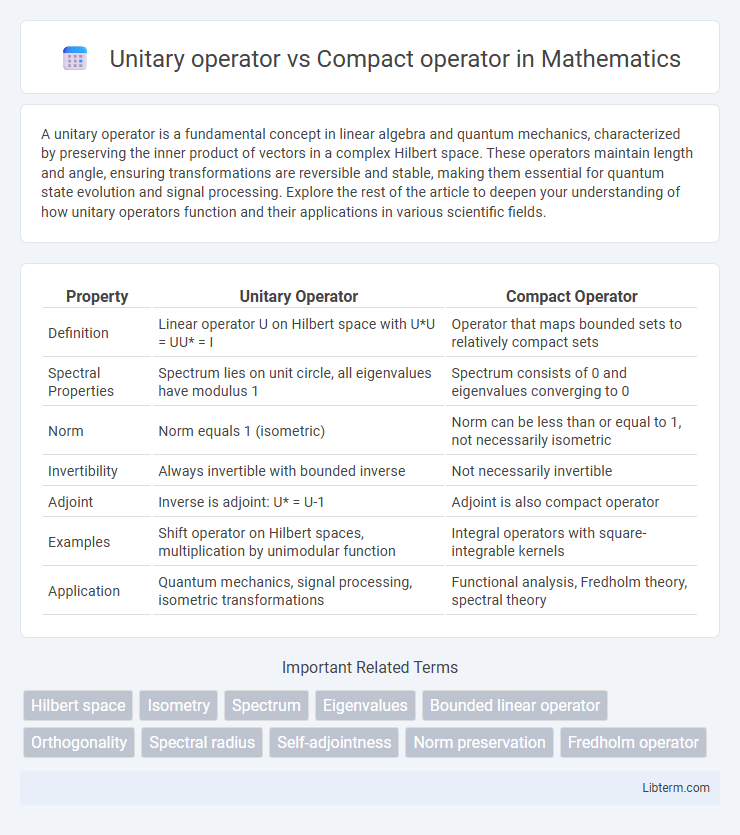A unitary operator is a fundamental concept in linear algebra and quantum mechanics, characterized by preserving the inner product of vectors in a complex Hilbert space. These operators maintain length and angle, ensuring transformations are reversible and stable, making them essential for quantum state evolution and signal processing. Explore the rest of the article to deepen your understanding of how unitary operators function and their applications in various scientific fields.
Table of Comparison
| Property | Unitary Operator | Compact Operator |
|---|---|---|
| Definition | Linear operator U on Hilbert space with U*U = UU* = I | Operator that maps bounded sets to relatively compact sets |
| Spectral Properties | Spectrum lies on unit circle, all eigenvalues have modulus 1 | Spectrum consists of 0 and eigenvalues converging to 0 |
| Norm | Norm equals 1 (isometric) | Norm can be less than or equal to 1, not necessarily isometric |
| Invertibility | Always invertible with bounded inverse | Not necessarily invertible |
| Adjoint | Inverse is adjoint: U* = U-1 | Adjoint is also compact operator |
| Examples | Shift operator on Hilbert spaces, multiplication by unimodular function | Integral operators with square-integrable kernels |
| Application | Quantum mechanics, signal processing, isometric transformations | Functional analysis, Fredholm theory, spectral theory |
Introduction to Unitary and Compact Operators
Unitary operators on Hilbert spaces are linear operators that preserve inner products and norms, ensuring isometric isomorphisms with bounded inverses whose adjoints serve as their inverses. Compact operators, characterized by mapping bounded sets to relatively compact sets, often generalize finite-rank operators and are integral in spectral theory due to their discrete spectrum with possible accumulation only at zero. Understanding the distinction between unitary and compact operators is crucial for advanced functional analysis and applications in quantum mechanics and operator algebras.
Defining Unitary Operators
Unitary operators are defined as linear operators on a Hilbert space that preserve inner products, meaning \( U^*U = UU^* = I \), where \( U^* \) is the adjoint of \( U \) and \( I \) is the identity operator. These operators are bijective isometries that maintain the norm and orthogonality of vectors, making them essential in quantum mechanics and signal processing. In contrast, compact operators map bounded sets to relatively compact sets, often lacking invertibility and not preserving inner product structure like unitary operators do.
Key Properties of Unitary Operators
Unitary operators preserve inner products, ensuring that for any vectors x and y, the equality
Defining Compact Operators
Compact operators are linear operators between Banach spaces that map bounded sets to relatively compact sets, meaning their image's closure is compact. These operators can be approximated in operator norm by finite-rank operators, making them generalizations of finite-dimensional transformations. Unlike unitary operators, which preserve norms and inner products, compact operators often exhibit spectral properties analogous to matrices with discrete spectra accumulating only at zero.
Characteristic Features of Compact Operators
Compact operators on Hilbert spaces are defined by their property of mapping bounded sets to relatively compact sets, ensuring that every sequence in the image has a convergent subsequence. These operators exhibit a spectrum consisting of zero and a sequence of eigenvalues converging to zero, with each nonzero eigenvalue having finite multiplicity. Unlike unitary operators, which preserve inner products and norms, compact operators often lack invertibility and do not maintain norm preservation, emphasizing their role in limit approximations and spectral theory.
Unitary vs Compact Operators: Key Differences
Unitary operators are bounded linear operators on a Hilbert space that preserve inner products and norms, ensuring they are isometric and surjective, while compact operators map bounded sets to relatively compact sets, often behaving like finite-dimensional approximations. Unitary operators have a spectrum lying on the unit circle, contrast with compact operators whose spectrum consists mostly of zero, apart from possibly countably many eigenvalues accumulating only at zero. The invertibility of unitary operators sets them apart from compact operators, which are generally non-invertible unless finite rank and identity-like.
Spectral Theory: Unitary vs Compact Operators
Unitary operators in spectral theory exhibit a spectrum lying entirely on the complex unit circle, reflecting their norm-preserving property and invertibility. Compact operators, contrastingly, have discrete spectra with zero as the only possible accumulation point, often resulting in eigenvalues converging to zero in infinite-dimensional spaces. This fundamental spectral distinction influences operator classification in Hilbert spaces and dictates their functional calculus and stability properties.
Examples in Functional Analysis
Unitary operators in functional analysis, such as the bilateral shift operator on Hilbert spaces, preserve inner product and norm, acting as isometric isomorphisms. Compact operators, exemplified by integral operators with square-integrable kernels or the Volterra operator on L2 spaces, map bounded sets to relatively compact sets and often approximate finite-rank operators. Unlike unitary operators, compact operators can have spectra accumulating at zero, highlighting distinct spectral properties in operator theory.
Applications in Quantum Mechanics and Mathematics
Unitary operators preserve inner products and are fundamental in quantum mechanics for representing time evolution and symmetry transformations in Hilbert spaces. Compact operators, often approximated by finite-rank operators, play a crucial role in spectral theory and perturbation analysis, allowing the study of discrete spectra and stability of quantum systems. In mathematics, unitary operators facilitate the classification of operator algebras, while compact operators enable Fredholm theory applications and the solution of integral equations.
Conclusion: Choosing the Right Operator
Unitary operators preserve inner product and norm, making them essential in quantum mechanics and signal processing where isometric transformations are required. Compact operators, characterized by mapping bounded sets to relatively compact sets, play a crucial role in spectral theory and integral equations due to their approximability by finite-rank operators. Selecting between unitary and compact operators depends on whether the emphasis is on norm-preserving transformations or on operators with discrete spectrum and compactness properties for approximation and convergence analysis.
Unitary operator Infographic

 libterm.com
libterm.com